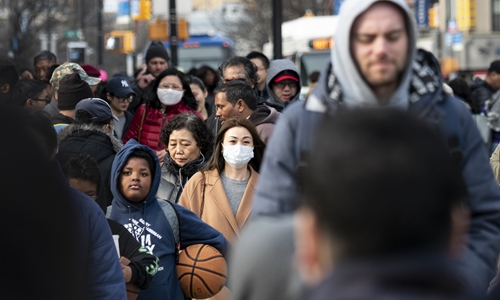HOME >> CHINA
Shortage prevents Westerners from wearing masks, sparks wider epidemic concerns
By Xu Keyue and Wan Lin Source:Global Times Published: 2020/3/4 21:58:40 Last Updated: 2020/3/4 21:18:40

People wear face masks as they walk down a street in Flushing area of Queens on Monday in New York City. Photo: AFP
A trend in some countries where residents are discouraged from wearing masks or may even get ridiculed if they wear one has worried some Chinese netizens and experts who believe that such a lack of epidemic control and prevention awareness could potentially escalate the COVID-19 epidemic globally.The trend also points to a question whether the no-need-to-wear-masks advice is the result of a shortage in masks or simply a cultural preference in some countries especially in Western countries.
Such worries are growing as confirmed COVID-19 cases outside China reached more than 12,000 as of Wednesday. Infections have been found in 75 other countries and regions, including the virus hotspots South Korea, Italy and Iran.
Chinese netizens are also worried that wearing masks remained rare among Western people, which resulted from government and media discouragement, short supply and cultural habits.
US surgeon general Jerome Adams urged the public on Twitter not to buy face masks which are ineffective in protecting the public from getting coronavirus. He suggested that the masks are saved for healthcare providers, since if they cannot get masks to care for sick patients, "it puts them and our communities at risk."
An article posted by US media outlet Forbes on Saturday carry the headline "No, you do not need face masks to prevent coronavirus—they might increase your infection risk."
Matteo Dall'Osso, an Italian lawmaker, was mocked for wearing a mask in the country's Lower Chamber on February 25, but Chinese netizens supported his behavior.
The president of the Swiss Chambers prohibited wearing a mask in Parliament, local media reported.
When it comes to whether ordinary residents need to wear masks, government manuals in countries such as Italy, France, Germany and Britain offer a similar advice: no.
An Italian student in the UK told the Global Times that they were confused whether they should wear masks. "Media reported that Chinese people wear masks to protect themselves but our authorities and some medical personnel said masks are not helpful," the student said.
Yang Zhanqiu, a virologist at Wuhan University, said that a normal mask does not directly block the tiny virus. But since the virus was mainly spread by attaching itself to droplets and aerosol particles, and the mask could block the droplets and aerosols, indirectly keeping the virus out, Yang told the Global Times on Wednesday.
Yang advised people to wear masks in public places, but noted that many countries may actually face a short of supply and have to prioritize the demand of medical workers.
China produced more than half of masks in the world before the outbreak and Western countries' production capacity is limited, media reported.
"Mask famine" has been reported globally in Japan, South Korea, the US and Europe. The US government has contracted with manufacturing giant 3M to produce 30 million more masks a month, the New York Times reported Saturday.
A Chinese student in the US told the Global Times that he cannot get face masks, online or offline, since mid-February. His family in China managed to buy some masks and mailed to him.
Patrick, a Seattle resident who works at an e-commerce company, told the Global Times that "Even hospitals are running low on masks."
"I have been to the hospital twice recently. One month ago, they were giving away masks to every patient who visited the office, but now they only give a few masks to people with flu-like symptoms."
There is also a cultural reason behind the choice of not wearing masks.
A UK resident surnamed Barrock aksed some of her European and American friends, and told the Global Times that they found wearing a mask "can make them feel worried" "afraid of being looked at differently," and "feel shy."
Some Chinese students abroad reached by the Global Times also noted the phenomenon, saying they would be "stared at like a virus spreader" if they go out with a mask.
"Only sick people wear masks — that's acknowledged to some extent in the US," said an anthropology student at Duke University.
Newspaper headline: Not wearing masks may escalate epidemic
Posted in: SOCIETY